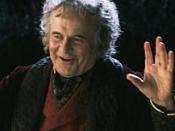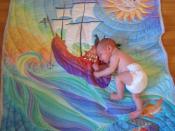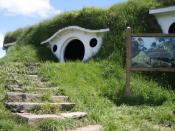Storytelling: In an explicit sense, Bilbo, Frodo and Sam are engaged in a literary endeavor, involving the chronicling of their adventures. After a major event has occurred, Sam often wonders how the story will be remembered and whether his own heroics will be forgotten. More often than not, the stories of the heroes that are presented in the trilogy are in a song form, rather than a written literary form. Many of the songs are Elvish and towards the end of The Return of the King, many of these songs are prophetic in nature, with Aragorn appearing as the foreshadowed King. Many of the present heroes are related to former heroes or presently engaged in some quest that originated in an anterior mission (for example, Frodo's quest of the Ring is the result of Bilbo's earlier adventure with the Ring). As a result, the songs are often celebratory (in regards to the past) and prophetic (in regards to the future).
Aging: Aging is a complicated theme in this last novel of the trilogy. On one extreme, we find Bilbo Baggins, who has become a very elderly (but also very sleepy) hobbit. His recurrent sleep prefigures the symbolic death that occurs in the sailing towards the Grey Havens. Even on the ride to the sea, Bilbo is half-asleep on his horse. Throughout the trilogy, the elves have represented a symbolic youth and regeneration. The passing of Galadriel and many elves certainly dampens the illusory hope of "eternal youth" that surrounded the elves. Indeed, the connection between the elves and "midsummer" is another symbol of extreme youth and life
Conservation and Heritage: One of the arguments of the Trilogy is that the present generation has an obligation to take care of its own problems and not leave them to the next...



OOPS!
Sorry for double post, this essay was submitted twice accidentally by me, sorry
0 out of 0 people found this comment useful.